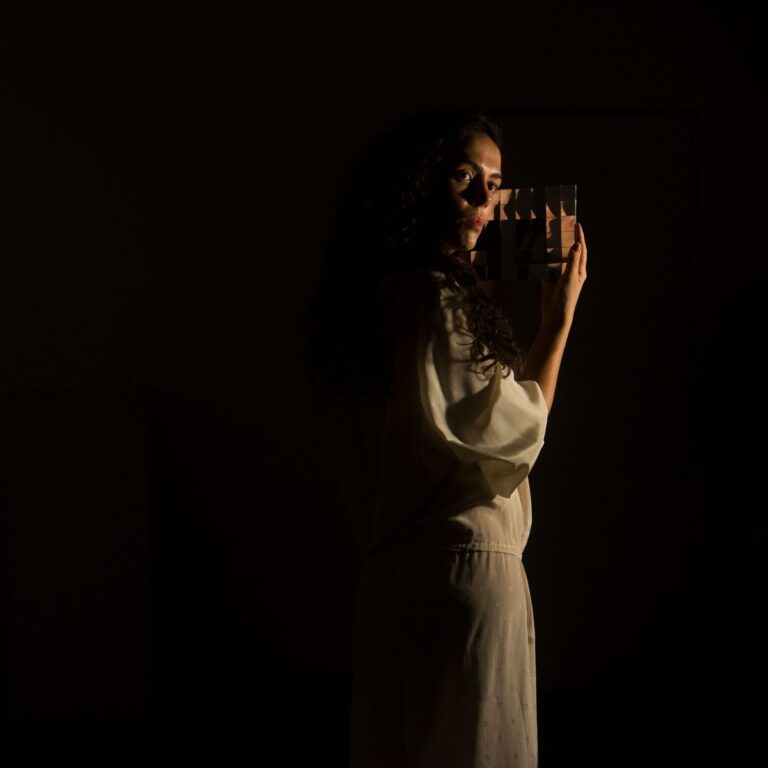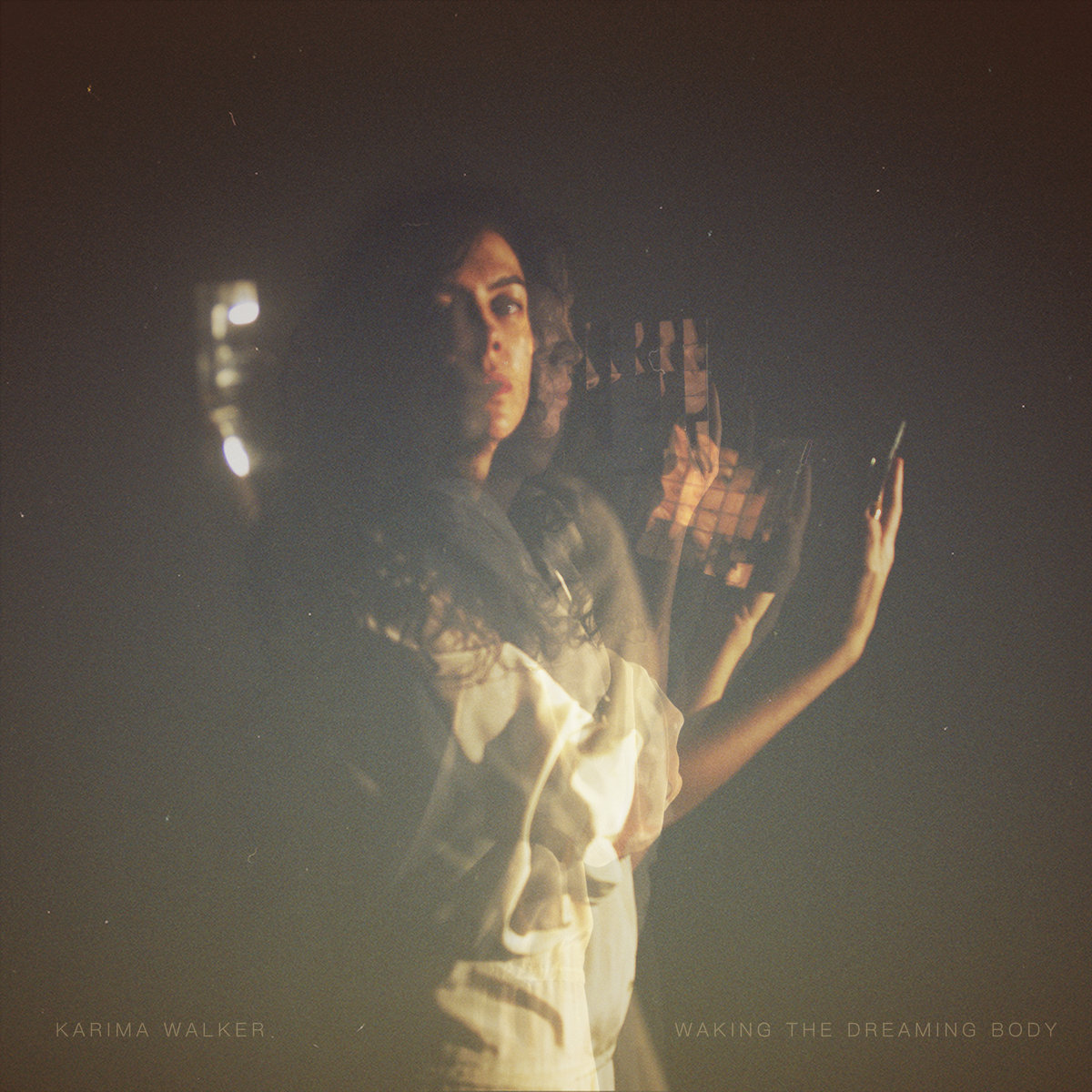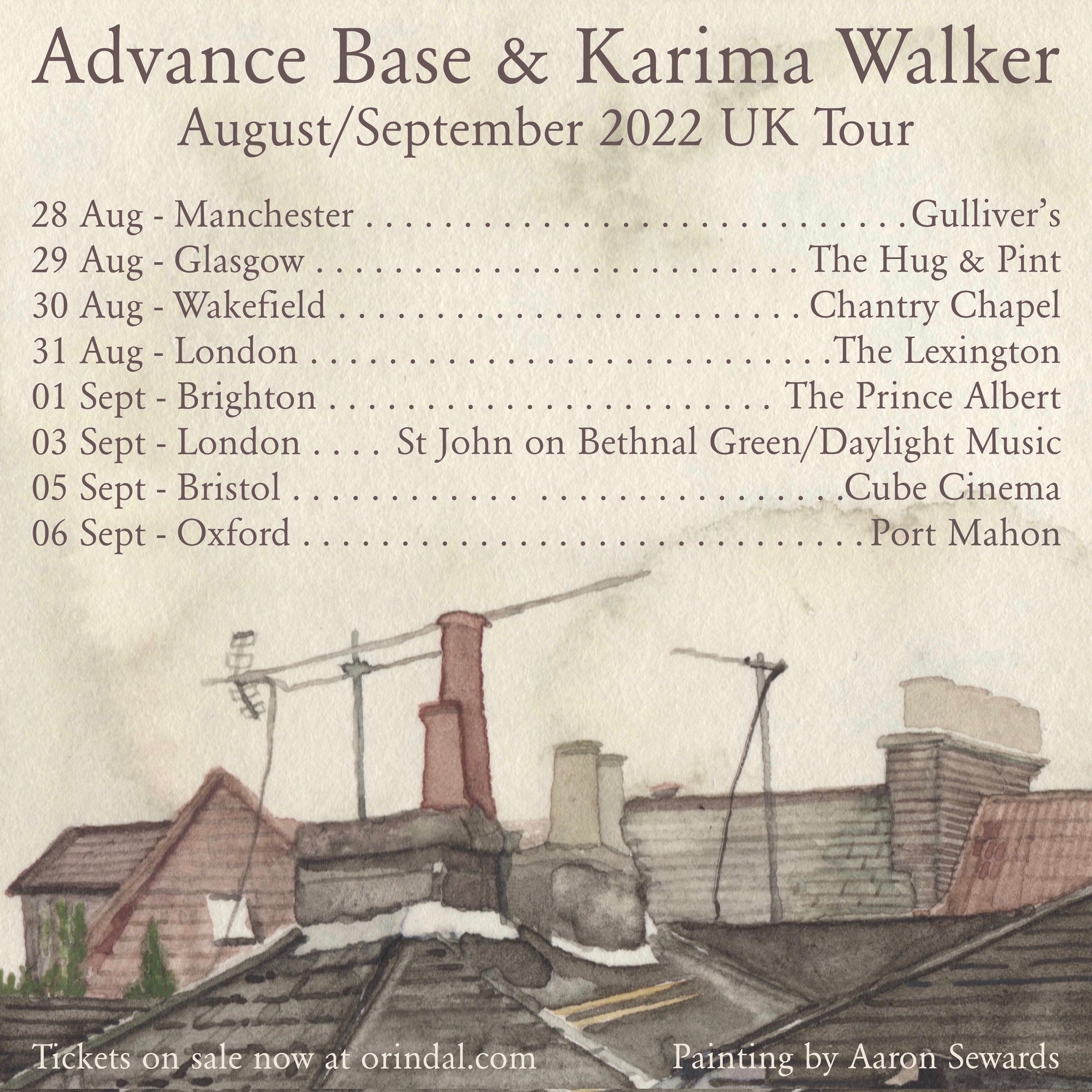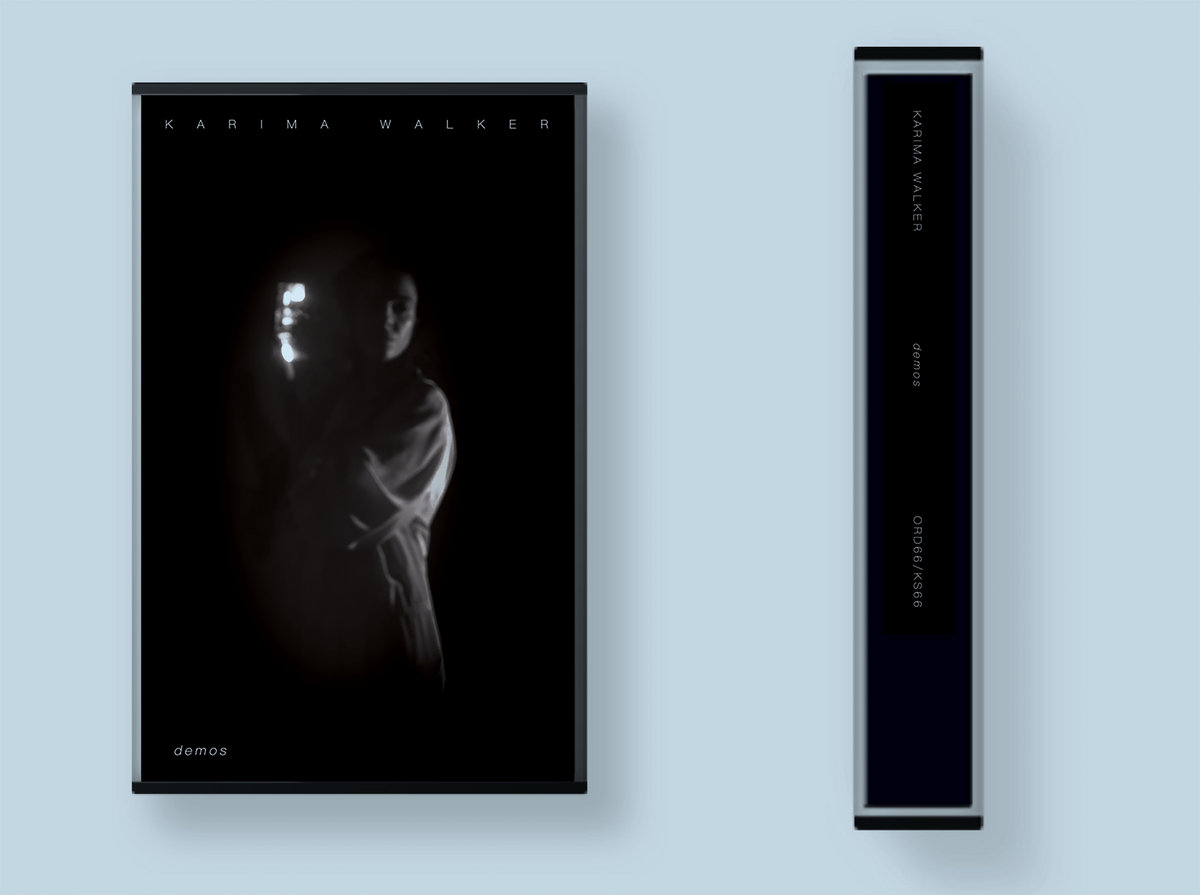I once heard a writer explain how they make a new document every time they save something. Document1_001, document1_002, document1_003. By the end of the process they had a huge line of drafts from first to final. That way, they figured, they never really lost anything. Should a section be altered or excised, the older drafts would ensure it remained. The idea was pitched as something reassuring, a safety net against wrong turns on any given day, but the thought raised a certain sense of alarm. Something in the permanence, the sheer accumulation. How could you work when everything remained? When what appeared good back in the naïve past lurked in your files, ready to pull the curtain from the whole thing?
Earlier this Spring, Karima Walker released demos, a new album with Orindal Records and Keeled Scales which paired older versions of some of the songs from 2021’s beautiful Waking The Dreaming Body with new compositions. The release provided a glimpse into the beginnings of the eventual album. With rougher, perhaps more intimate acoustic arrangements and slight lyrical differences. The deviations from what we know as the ‘final’ versions are conspicuous in hindsight, but so to is the sense of latent possibility. The soul of something forming, even if it hasn’t yet realised its true physical body.
The result proves an inadvertent rebuttal of the fears around preserving early drafts. A lesson in the value of looking back, if only to remember the dual nature of creation. A combination of abstract magic and mundane perseverance. The easy inspiration, the mechanical work. For the final thing does not fall into complete existence but rather takes shape in the manner of a natural landscape. An uneven process of slow movement and violent change, where any divine beauty or imagination is underpinned by a long physical act, occurring day after day. The songs of demos are no less representative of the ones of Waking the Dreaming Body than a landscape a hundred years ago is of a landscape today.
demos challenges the binary between ‘demo’ and ‘final’, just as Waking the Dreaming Body challenges other such binaries. “The release is a product of both isolation and connection,” we wrote in our review. “The former fostering the latter in strange ways. In confronting the surrounding environment and considering her place within it, Walker traces lines between the self and the outside so that such boundaries might be challenged and blurred.” Songs crafted by both sound designer and singer-songwriter, deep rooted in conscious and unconscious thought, and both interior and exterior spaces. Environments which might feel complete or permanent within any given moment, but always subject to change.
[bandcamp width=100% height=120 album=351251647 size=large bgcol=ffffff linkcol=0687f5 tracklist=false artwork=small track=3011033464]
As Walker prepares to head off on a UK tour with Advance Base, we took the opportunity to ask her a few questions about the new release and her work more generally. Check out the tour dates below then scroll on down for the interview, which Walker answered, fittingly, from an airport with gear and merch in tow.
Aug 28, 2022- Manchester, UK @ Gulliver’s
Aug 29, 2022- Glasgow, UK @ The Hug & Pint (w/ Raveloe)
Aug 30, 2002- Wakefield, UK @ Chantry Chapel
Aug 31, 2022- London, UK @ The Lexington (w/ Herbal Tea)
Sept 01, 2022- Brighton, UK @ The Prince Albert
Sept 03, 2022- London, UK @ St John on Bethnal Green / Daylight Music (w/ Robert Stillman)
Sept 04, 2022- Salisbury, UK @ End of the Road Festival (just Karima Walker, no Advance Base)
Sept 05, 2022- Bristol, UK @ Cube Cinema (w/ SH Davidson)
Sept 06, 2022- Oxford, UK @ Port Mahon (moved from The Library) (w/ Katie Malco)
Thanks so much for speaking with us Karima, and congratulations on demos. Does it feel different releasing a record that’s not quite new?
It does feel different, casual!
As a listener, I’m always fascinated to hear early versions of songs. How the vision for the track might have altered, what seeds would eventually blossom into the finished thing. But if I put on my writer cap, the prospect of going through my own old drafts caused a specific sense of dread. The interest might still be present, but there’s a competing trepidation too. Like you might be dispelling the mirage somehow. Does this ring true? And if so, how did you tackle the unease?
It does feel vulnerable… with “Reconstellated,” I sat with different iterations of it for well over a year. It’s almost like I owed something to the versions that brought so much to the final song, even if they weren’t present in it, in the end. In this state, the demos are still rough but feel like they have potential, so this release feels lighter.
To invert the question, what about the reverse situation? Do you feel your relationship with Waking the Dreaming Body has been altered by returning to the demos? Did you learn anything new about the songs in revisiting their early forms?
I do. On one hand there’s magic in how a song arrives but part of assembling these demos was reminding myself that they don’t always fall out of the sky. A lot of it is a much more mundane process. I’m a ways out from writing WTDB, so as I start writing again it’s helpful to hear the kind of questions I was asking for that record, how I assembled it.
[bandcamp width=100% height=120 album=351251647 size=large bgcol=ffffff linkcol=0687f5 tracklist=false artwork=small track=2523596001]
The two versions of ‘Window I’ offer one of the most interesting comparisons because they foreground one of the most striking features of Waking the Dreaming Body. The porous line between a more traditional folk style and an experimental found sound/drone. Do you feel you identify more strongly with any one position along the songwriter-composer spectrum? Does your future seem to lean toward either end, or is resisting any clear binary the only certainty?
I am honestly not sure. I’m very impressionable when I’m listening to something I love, so it changes all the time… I don’t know if I could hang out on one side of those paths forever. I love that porous line, how one thing somehow becomes something else, and all the moments in between that can feel just as complete, or sometimes better than where you begin or end. I do like structure though, framing those moments around questions of perception, gender, the self-other dichotomy… On WTDB, I was wanting songs that felt complete and solid, compositions that felt whole and I wanted them to all happily co-exist together. Right now I’m writing you from an airport, surround by over a hundred pounds of my gear and merch, so sometimes I think it’s time to write folk songs.
To talk about craft more generally, what is the typical process when writing a song? Is it a case of generating a bunch of rough material and returning to hone it once halfway complete, or are you more meticulous within each track? Like, would you perfect an opening or chorus before tackling the rest of the piece? Or follow something through and polish it later?
I try to be open to whatever is coming my way… some days I’m showing up for a song even if I’m not feeling it, and that feels more like the former, documenting what happens through play, then looking back over it and doing the honing/editing work of reading what this body of parts is. But sometimes things do surface with more completeness built in, or more urgency, and I want to be available for that too. If my intuition is saying to dive deep into something then I try to leave room for that.
You wrote about the link between breathing and landscapes when announcing single ‘how it falls apart’, how words come when you’re running and form “a way of mapping or notating a place/landscape.” Could you talk a little on how this phenomenon informed the song, or indeed your work more widely?
When I’m out, moving my body, it’s like I’m shaking loose all the associations and ideas that were up there in my brain, stagnating. But then also, being outside and aware of what’s around me is an endless source of joy and inspiration, it’s hard not to connect to my creative brain when I’m feeling good and alive and awake. All that life around me starts to imprint on my internal world.
In a very physical sense, running over a trail feels like mapping or reading a score. I’m active in the former- moving through the landscape, and receptive in the latter- being shaped by the choices of trail builders, game trails, elevations. I’d noticed how my breathing rhythm would change over the course of a run, so I recorded my breath and footsteps on a trail near my house… I wanted to see if I could listen back to the recording later and remember where the uphills and downhills were. I suppose the audio isn’t technically a map, since a map presents itself visually, all at once, where as an audio recording opens up over time. But we consent to the components of a map or a score when we follow a path. It feels like collaborative performance.
Speaking of landscapes, we can’t talk about your work without touching upon the importance of the environment. There’s something about the balance between reality and unreality on WTDB which feels unique to the desert. Perhaps I’m projecting, writing from a place about as far from a desert as somewhere could be, but it seems a desert is the most real and unreal of places. Are you aware of the landscape’s influence on your work? Do you think it would sound different if you lived elsewhere?
I was just in Florida, and had really only been there once before. I’d walk around, filled with awe, with my mouth hanging open because I just could not fathom the trees and flora… they’re just so different. Huge, weblike, loud, lush worlds. I think I know what you mean by unreal… being in a landscape that is just so incredibly different from what I know, I was left to observe without a lot of language to help me. It’s a very joyful childlike frame of mind. I guess I’d suggest that those emotional, inner and dream realities, though very squishy, are still very real but that language fails in articulating that reality, maybe that’s where the unreal-ness comes from. There’s a knowledge in the body that can navigate those realities in ways my rational thinking brain just can’t. I think I’m aware of the landscapes influence on my work, and I’m pretty certain it would sound different if I was somewhere else, or with people when I wrote.
[bandcamp width=100% height=120 album=351251647 size=large bgcol=ffffff linkcol=0687f5 tracklist=false artwork=small track=3011033464]
Talking of places far from deserts, you’re about to head out on a UK tour with Advance Base. It’s a difficult time for obvious reasons, but speaking more generally, what role does touring and live performance play within your work? Does it feel part of the creative process?
Touring, especially with friends, and playing live are sources of real joy for me. Then there’s the connected and slightly different kind of joy, the… maybe more fraught joy of having a creative practice. The logistics of tour give my days structure and purpose, reconnects me to the network of friends and community, that I often only see when I’m on the road, and to places I love very much.
Live performance is immensely fulfilling and at the same time a huge output of energy. I build my sets around a narrative arc and it feels like a theater-healing ritual, to transition through different places and arrive at a resolution of some kind.
demos is out now via Orindal Records and you can get it from Bandcamp.




